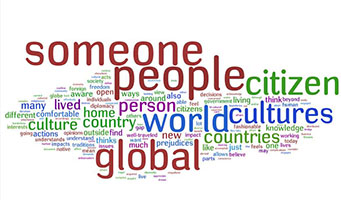Online Course
NURS 418/NRSG 609 – Essentials & Practice in Global Health Nursing
Introduction to Global Health
Module: Globalization
What is needed in a globalized world?
“Both as citizens and as nurses, we need to explore the health and human rights dimension that globalization brings about in our world, sometimes referred to as a village, so as to understand our professional responsibilities. These responsibilities go beyond understanding the basic issues to include possible actions we can take to influence policy and events before they occur, and work to improve the outcome of new policies as well as the ones already in place.” (Tschudin and Davis 2008)
To understand global health, we will take a step back and gain a broader perspective on health and look at the forces associated with and consequences of globalization. In this course, we examine how globalization impacts health outcomes for populations and how globalization processes impact health care workers and health care infrastructure. Not only do we ask who is impacted by globalization, but also who is MOST impacted by globalization.
While markets are the engines of the economy, they alone do not deliver the benefits.
Economist Amartya Sen (1999) emphasized the Importance of considering poverty as a “deprivation of basic capabilities” and not simply as low income. Examples of these deprivations:
- premature mortality
- significant undernourishment, esp. children
- persistent morbidity
- widespread illiteracy
As we continue to learn more about the dynamic of globalization, we will explore more deeply the relationship between gender and global inequalities. For example, are girls and women disproportionally impacted by the consequences of globalization? Controversies about globalization focus on powerful individuals/groups/institutions that have exploited and continue to exploit vulnerable people. Examples: slavery, indentured servitude, trafficking of people, esp children & women.
Globalization (Tschudin & Davis, 2008)
✓Is here to stay.
✓Affects health status and healthcare for individuals, population groups, nations, regions, and the globe.
✓Impacts nursing at all levels and in all places.
✓Can create benefits to be gained, yet most often any benefits are disproportionately distributed.
✓Also creates numerous problems, not always acknowledged by people in countries that currently benefit from this economic arrangement.
✓Needs to be understood in relation to historical, social, class, and gender issues.
✓Is highly impacted by the actions of multinational companies, which according to some have replaced national governments, and control the economy of nations in a transnational mode.

This website is maintained by the University of Maryland School of Nursing (UMSON) Office of Learning Technologies. The UMSON logo and all other contents of this website are the sole property of UMSON and may not be used for any purpose without prior written consent. Links to other websites do not constitute or imply an endorsement of those sites, their content, or their products and services. Please send comments, corrections, and link improvements to online@son.umaryland.edu.